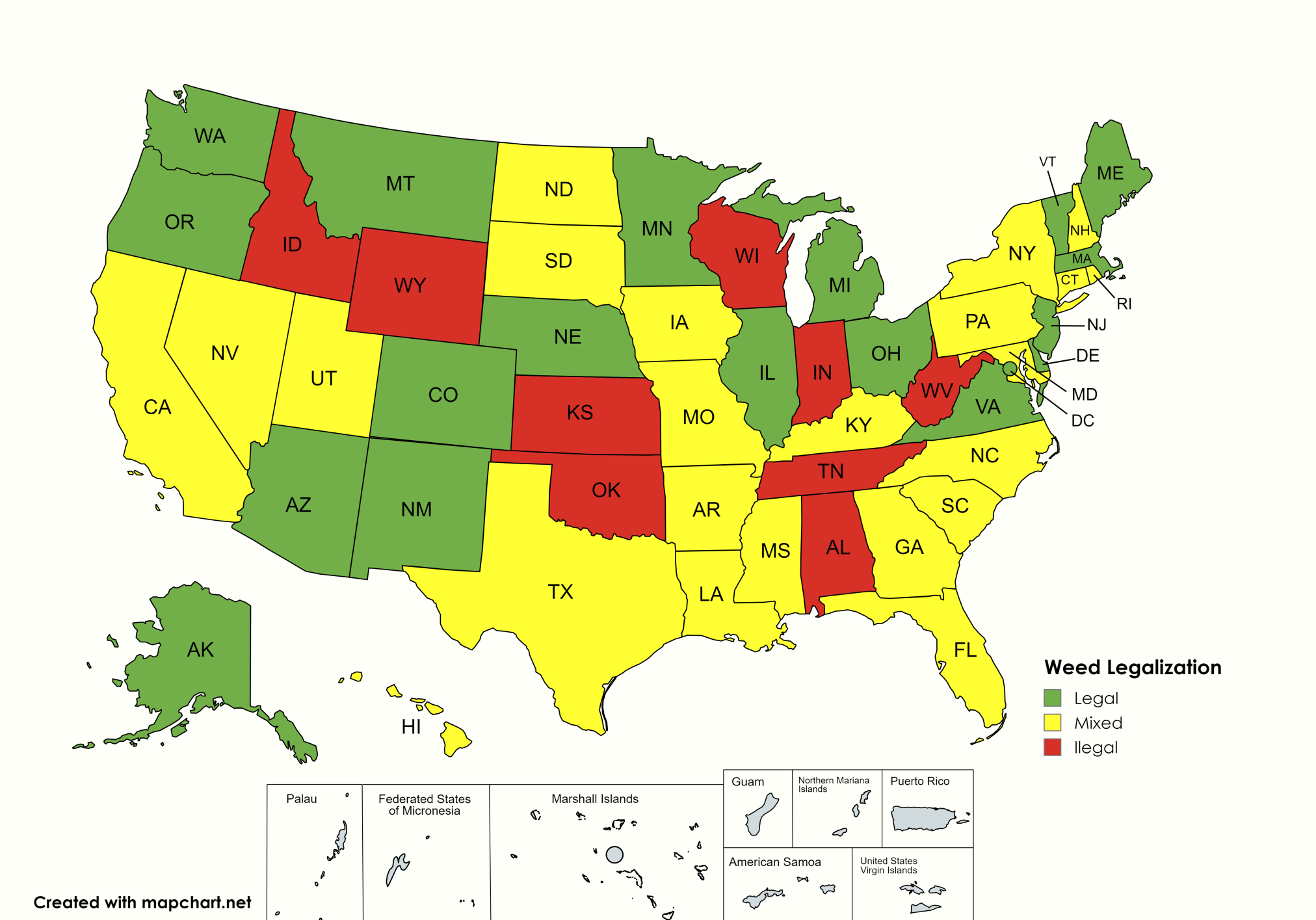As more and more states are embracing marijuana legalization, I’ve discovered a fascinating trend sweeping across many regions. The rise of marijuana legalization is driven by a combination of factors, but in my viewpoint, I believe marijuana legalization is expanding due to two primary reasons.
Table of Contents
Top 2 Reasons Why More Places Are Legalizing Marijuana
1. Shifting Perceptions
Firstly, shifting perceptions play a pivotal role. Over time, there’s been a remarkable shift in societal attitudes toward cannabis, largely fueled by increasing research showcasing its medicinal benefits. This evolving perception has paved the way for greater acceptance of legalization initiatives.
2. Economic Opportunities
Secondly, economic opportunities abound in the cannabis industry. Governments worldwide are beginning to recognize the immense economic potential of legalizing cannabis. This includes not only job creation but also the generation of substantial tax revenue and the stimulation of ancillary industries.
Wondering if your state or region has legalized marijuana cultivation?
For those curious about cannabis growing regulations in their specific location, I recommend starting with the official government website of your country, state, or province. There, you’ll likely find comprehensive information on cannabis legalization and growing guidelines tailored to your region.
Here are some examples of where you can find official information on marijuana legalization in various regions:
- United States (US) Website:
U.S. Department of Agriculture (USDA)
National Conference of State Legislatures (NCSL)
- Europe Website:
European Monitoring Centre for Drugs and Drug Addiction (EMCDDA)
European Union official website
- Costa Rica Website: Ministry of Health (Ministerio de Salud)
- Peru Website: Ministry of Health (Ministerio de Salud)
- Mexico Website: Federal Commission for Protection against Sanitary Risk (COFEPRIS)
- Japan Website: Ministry of Health, Labour and Welfare (厚生労働省)
Please note that the availability of information on cannabis legalization may vary, and you may need to navigate through different sections or use the search function on these websites to find specific details about cannabis laws and regulations.
For your convenience, I’ve compiled a comprehensive list of states in the U.S. and Europe with marijuana legalization, featuring detailed information on recreational and medical growing regulations, plant limits, and additional notes. Start exploring now!
Listing States in the U.S. Where Marijuana is Legal

Is weed legal in Tennessee?
Recreational Growing: Illegal
Medical Growing: Limited medical use allowed under certain conditions (Illegal: Individuals are imprisoned for possessing small amounts of cannabis — possession of a half-ounce or less is punishable by nearly a year of incarceration.)
Plant Limits: Not applicable (Medical use is restricted)
Notes: Possession of small amounts for personal use is decriminalized, but recreational cultivation remains illegal.
Is weed legal in Texas?
Recreational Growing: Illegal
Medical Growing: Limited medical use allowed under the Compassionate Use Program
Plant Limits: Not applicable (Medical use is restricted)
Notes: Recreational use remains illegal, although there are ongoing discussions about potential reforms.
Is weed legal in North Carolina?
Recreational Growing: Illegal
Medical Growing: Limited medical use allowed under the Epilepsy Alternative Treatment Act
Plant Limits: Not applicable (Medical use is restricted)
Notes: Recreational use remains illegal, with some efforts towards decriminalization.
Is weed legal in Oklahoma?
Recreational Growing: Illegal
Medical Growing: Medical marijuana is legal with a physician’s recommendation
Plant Limits: Allowed for licensed medical marijuana patients and caregivers
Notes: Oklahoma has a relatively liberal medical marijuana program.
Is weed legal in South Carolina?
Recreational Growing: Illegal
Medical Growing: Limited medical use allowed under the Epilepsy Alternative Treatment Act
Plant Limits: Not applicable (Medical use is restricted)
Notes: Recreational use remains illegal, with some efforts towards decriminalization.
Is weed legal in Virginia?
Recreational Growing: Legal (as of 2021)
Medical Growing: Legal
Plant Limits: Up to four plants per household for personal use
Notes: Legalization for both recreational and medical use was passed in 2021.
Is weed legal in Indiana?
Recreational Growing: Illegal
Medical Growing: Cannabis is currently illegal for medical and recreational purposes in Indiana.
Plant Limits: Not applicable (Medical use is restricted)
Notes: Recreational use remains illegal, with some efforts towards decriminalization.
Is weed legal in Kentucky?
Recreational Growing: Illegal
Medical Growing: Limited medical use allowed under the Kentucky Cannabis Program
Plant Limits: Not applicable (Medical use is restricted)
Notes: Possession of small amounts for personal use is decriminalized, but recreational cultivation remains illegal.
Is weed legal in Arkansas?
Recreational Growing: Illegal
Medical Growing: Medical marijuana is legal with a physician’s recommendation
Plant Limits: Allowed for licensed medical marijuana patients and caregivers
Notes: Arkansas has a medical marijuana program but recreational use remains illegal.
Is weed legal in Montana?
Recreational Growing: Legal (as of 2021)
Medical Growing: Legal
Plant Limits: Up to four plants per household for personal use. (Adults may cultivate up to two mature marijuana plants and two seedlings for private use in a private residence, subject to certain restrictions. (Medical marijuana cardholders may cultivate up to four mature plants and four seedlings). The plants may not be visible to the public.
Notes: Legalization for both recreational and medical use was passed in 2021.
The Impact of Marijuana Legalization in the United States
Marijuana legalization has had a certain positive impact on the economy and employment. Since marijuana legalization, the industry has contributed $43.5 billion to Canada’s GDP and $13.3 billion to the province of Ontario, reflecting its direct contribution to the economy. At the same time, marijuana legalization has created over 151,000 jobs in Canada, allowing this emerging industry to develop and bringing a large number of new job opportunities. Analysis indicates that legalization can provide a new source of tax revenue for the government, contributing to economic development. The government can tax marijuana products, adding a new channel for fiscal revenue. In addition to the production and sale of marijuana itself, legalization may also drive the development of upstream and downstream industries such as cultivation, processing, logistics, and retail, further boosting employment and economic growth. It is mentioned that legalization helps reduce the existence of the illegal marijuana market, thereby reducing social costs such as law enforcement and the judicial system.However, some reports have also pointed out potential economic challenges that legalization may bring, such as mentioning the need for proper government management and regulation. Overall, marijuana legalization does have a positive impact on the economy and employment, but the specific effects depend on the specific policies and implementation in each region.
However, some reports have also pointed out potential economic challenges that legalization may bring, such as mentioning the need for proper government management and regulation. Overall, marijuana legalization does have a positive impact on the economy and employment, but the specific effects depend on the specific policies and implementation in each region.
Listing States in the Europe Where Cannabis is Legal
Is weed legal in Italy?
Recreational Growing: Decriminalized (small quantities)
Medical Growing: Legal with prescription
Plant Limits: Not applicable (Medical use is regulated)
Notes: Italy allows cultivation for medical purposes under strict regulations.
Is weed legal in Spain?
Recreational Growing: Decriminalized (private consumption)
Medical Growing: Legal with prescription
Plant Limits: Not specified for medical use
Notes: Spain has a tolerant approach to personal use but prohibits commercial sale and cultivation.
Is weed legal in Greece?
Recreational Growing: Decriminalized (private consumption)
Medical Growing: Legal with prescription
Plant Limits: Not specified for medical use
Notes: Spain has a tolerant approach to personal use but prohibits commercial sale and cultivation.
Is weed legal in France?
Recreational Growing: Illegal
Medical Growing: Limited medical use allowed under certain conditions
Plant Limits: Not applicable (Medical use is restricted)
Notes: France has strict laws against recreational use but allows limited medical use in specialized cases.
Is weed legal in Iceland?
Recreational Growing: Illegal
Medical Growing: Limited medical use allowed under certain conditions
Plant Limits: Not applicable (Medical use is restricted)
Notes: Iceland has strict laws against both recreational and medical cannabis use.(medicinal cannabis, prescribed by a licensed neurologist, can be legally obtained and used. )
Is weed legal in Austria?
Recreational Growing: Illegal
Medical Growing: Limited medical use allowed under certain conditions
Plant Limits: Not specified for medical use
Notes: Austria allows medical cannabis under strict regulations but prohibits recreational use and cultivation.
Development Prospects and Challenges for the European Cannabis Industry
The development prospects for the European cannabis industry are promising. As more and more European countries legalize cannabis for medical and recreational use, the market size will continue to expand, and the industry is expected to experience rapid growth. With the improvement of the legal environment, the cannabis industry chain will become more complete, driving the development of related industries such as cultivation, processing, logistics, and retail. The legalization of cannabis also creates new sources of tax revenue for governments, which is beneficial for the long-term development of the industry. Public perception of cannabis is gradually changing, and social acceptance is increasing, creating a favorable environment for the industry’s development.
However, the development of the European cannabis industry also faces numerous challenges. At the EU level, there is a lack of unified cannabis legalization regulations, and policy differences among countries bring uncertainty to the industry’s development. There is a need to strengthen the regulation of the quality and safety of cannabis products to prevent abuse and illegal trade. Some countries maintain a conservative attitude towards cannabis legalization, which may slow down the development of the entire European industry. It is necessary to eliminate the public’s negative perception of cannabis and increase social awareness. Further research is needed on the health effects of cannabis to avoid potential risks. Additionally, there is a need to address the financing difficulties faced by the cannabis industry and attract more investment to support its development.
Overall, while the prospects for the European cannabis industry are promising, the challenges cannot be ignored. Only by adopting a cautious approach, improving regulations, and strengthening supervision can the industry achieve sustainable and healthy development.
The Impact of Marijuana Legalization on Society, Healthcare, and Criminal Justice
Marijuana legalization will have an impact on society, healthcare, and the criminal justice system. On a societal level, legalization may reduce the stigmatization and discrimination against drug users, but it may also lead to an increase in marijuana use rates, especially among young people, thus necessitating stronger education and prevention efforts. In the healthcare field, legalization provides patients with more options for cannabis-based medications, but it also requires strengthening the regulation of product quality and safety, as well as further research into the long-term health effects of marijuana.
In the criminal justice system, marijuana legalization can reduce non-violent marijuana-related crimes and incarceration rates, alleviating the burden on the judicial system. At the same time, legalization also helps combat the illegal marijuana market and related criminal activities, but it cannot completely solve the deep-rooted systemic discrimination issues within the judicial system. Therefore, clear legal regulations need to be established to regulate the legal marijuana market.
Overall, marijuana legalization has both advantages and disadvantages for society, healthcare, and the criminal justice system. It is necessary to weigh the pros and cons, improve relevant regulations and control measures, maximize the positive impacts of legalization, while avoiding potential risks.
Conclusion
In conclusion, the landscape of marijuana legalization is evolving, with an increasing number of states and countries embracing both medical and recreational use. From shifting societal attitudes to recognizing economic opportunities, various factors contribute to this trend. Whether you’re inquiring about cannabis legality in the United States, Europe, or other regions, it’s essential to consult official government sources for the most accurate and up-to-date information. Explore the opportunities and regulations surrounding marijuana cultivation and use, and stay informed about the latest developments in this rapidly changing industry.

The VIVOSUN Team, specializes in tropical plant and cannabis cultivation research. With extensive experience in indoor growing equipment operation and research, they lead innovation in the field. Through articles, workshops, and industry forums, they share practical insights to empower growers and shape the future of indoor cultivation practices.






